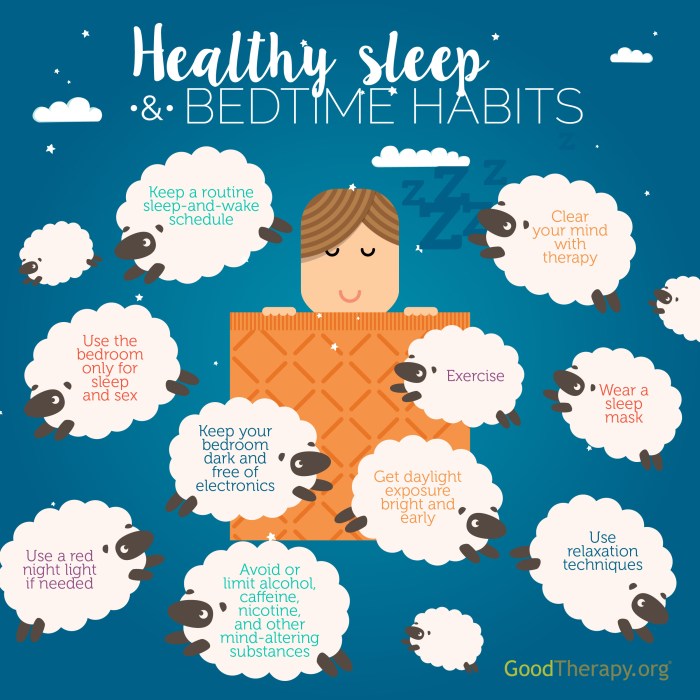Sleep hygiene sets the stage for a restful night’s sleep, impacting your overall well-being and daily performance. Dive into the world of sleep hygiene and discover how simple habits can make a big difference.
Importance of Sleep Hygiene

Sleep hygiene refers to the practices and habits that are conducive to getting a good night’s sleep on a regular basis. It plays a crucial role in maintaining overall well-being, both mentally and physically. Good sleep hygiene can significantly improve mental clarity, focus, and physical health, while poor sleep hygiene can lead to a range of negative consequences.
Benefits of Good Sleep Hygiene
- Improved cognitive function: Adequate sleep enhances concentration, memory, and decision-making abilities.
- Enhanced mood: Quality sleep reduces irritability, stress, and mood swings.
- Boosted immune system: Proper rest strengthens the body’s defenses against illnesses.
- Physical well-being: Adequate sleep supports muscle recovery, weight management, and overall physical health.
Effects of Poor Sleep Hygiene
- Decreased productivity: Lack of sleep can impair cognitive function and lead to poor performance at work or school.
- Increased risk of chronic conditions: Insufficient sleep is linked to conditions like obesity, diabetes, and heart disease.
- Mental health issues: Poor sleep hygiene can contribute to anxiety, depression, and mood disorders.
- Daytime fatigue: Feeling tired during the day can impact energy levels, motivation, and overall quality of life.
Creating a Sleep-Inducing Environment
Creating the right environment is crucial for a good night’s sleep. Factors like lighting, noise, temperature, and bedding play a significant role in promoting healthy sleep hygiene.
Setting the Mood with Lighting, Sleep hygiene
When it comes to lighting, opt for dim, warm lights in the evening to signal to your body that it’s time to wind down. Avoid bright overhead lights and consider using blackout curtains to block out any unwanted light sources.
Managing Noise Levels
Noise can disrupt your sleep, so aim to minimize any disturbances. White noise machines or earplugs can help drown out sounds that might keep you awake. Creating a quiet and peaceful atmosphere in your bedroom is key.
Regulating Temperature for Comfort
Maintaining a cool room temperature can enhance sleep quality. Your body naturally cools down as you sleep, so a slightly cooler environment can aid in this process. Experiment with different bedding materials to find what works best for you.
Optimizing Bedding and Decluttering Space
Invest in a comfortable mattress and pillows that support your body well. Declutter your bedroom to create a calming space that promotes relaxation. Keep electronics out of the bedroom to reduce distractions and improve sleep quality.
Establishing a Consistent Sleep Routine: Sleep Hygiene
Establishing a consistent sleep routine is crucial for maintaining good sleep hygiene. By going to bed and waking up at the same time every day, you help regulate your body’s internal clock, also known as the circadian rhythm. This consistency signals to your body when it’s time to sleep and when it’s time to wake up, leading to better overall sleep quality.
Strategies for Winding Down Before Bedtime
- Avoid screens: Limit exposure to electronic devices such as smartphones, tablets, and computers at least an hour before bed. The blue light emitted by these devices can interfere with the production of melatonin, a hormone that regulates sleep.
- Relaxation techniques: Engage in calming activities like reading a book, taking a warm bath, or practicing deep breathing exercises to help your body relax and unwind before bedtime.
- Create a bedtime routine: Establish a pre-sleep routine that signals to your body it’s time to wind down. This could include activities like listening to soothing music or drinking a cup of herbal tea.
Impact of Irregular Sleep Patterns
Irregular sleep patterns can disrupt your circadian rhythm, leading to difficulty falling asleep, staying asleep, and waking up feeling refreshed. Chronic sleep disturbances can also increase the risk of developing various health issues, such as obesity, heart disease, and mood disorders. By prioritizing a consistent sleep routine, you can improve your sleep quality and overall well-being.
Limiting Stimulants and Electronics Before Bed

To ensure a good night’s sleep, it’s crucial to limit stimulants and electronic devices before bedtime. These factors can disrupt your sleep quality and make it harder to fall asleep.
Caffeine, a common stimulant found in coffee, tea, and energy drinks, can stay in your system for hours, keeping you alert when you should be winding down for bed. Similarly, alcohol may help you fall asleep initially, but it can disrupt your sleep cycles, leading to poor-quality rest.
Electronic devices emit blue light, which can interfere with your body’s production of melatonin, the hormone that regulates sleep. The constant stimulation from screens can also keep your mind active, making it difficult to relax and prepare for sleep.
To wind down without relying on stimulants or screens, consider alternatives like reading a book, taking a warm bath, practicing relaxation techniques like deep breathing or meditation, or listening to calming music. These activities can help signal to your body that it’s time to rest.
Disconnecting from technology before bedtime has numerous benefits for improved sleep hygiene. It allows your brain to unwind and reduces the mental stimulation that can interfere with falling asleep. By creating a screen-free bedtime routine, you can establish a more peaceful environment that promotes better sleep quality.
